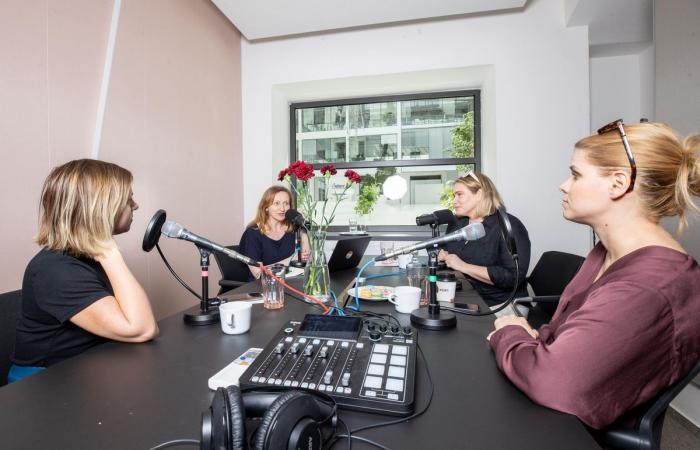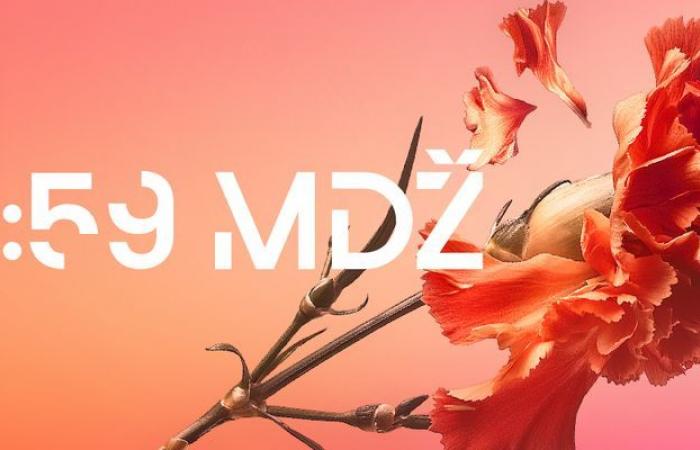One politician offered his genitals instead of a handshake, the other Miloš Zeman made fun of at a press conference. Another was singled out by a man in a hotel, because of her sexual orientation, insults about her appearance are quite common for the politician, even in real life. These are some of the experiences of women who share their experiences from the public space in the new MDŽ podcast. Once a fortnight, he makes the regular news production of the 5:59 podcast special.
What will you hear in the new MDŽ podcast?
- What are the worst experiences women have experienced in connection with hatred in public space.
- That the hating of women is often sexualized, which men tend not to encounter.
- How to cope with such a wave of self-hatred and not go crazy from it.
Lenka Kabrhelová invited Seznam Zpráv editor-in-chief Veronika Lehovcová Sucha to the microphone as a reinforcement for the new podcast, and together they started a debate about hate speech with their two guests.
Zuzana Kovačič Hanzelová, a Slovak presenter and author of podcasts for the SME daily, recalled her experiences in the MDŽ from the time when she went to the parliament and interviewed members of parliament as an editor of Slovak public radio. One of them offered her his natural one instead of a handshake. “It was pretty disgusting. Today, I would have answered him, I just left then, it shocked me,” the journalist recalls.
The second MDŽ guest, Seznam Zpráv political reporter Lucie Stuchlíková, adds a not-so-old experience of a meeting with Andrej Babiš, where her colleague Václav Dolejší was also present. “We were at his presidential campaign in Liberec and Andrej Babiš was standing there and there were an awful lot of people around and us journalists, and he suddenly turned to me and said, this is the Stuchlíková from the lying Seznam Práv, she’s lying! And those guys are standing around me (…) it’s not a very pleasant feeling when a politician is cheering like that,” Stuchlíková describes.
Photo: Renata Matějková, Seznam Zpravy
Moderators and guests of the first episode of the MDŽ podcast. From left: Veronika Lehovcová Suchá, Lucie Stuchlíková, Zuzana Kovačič Hanzelová, Lenka Kabrhelová.
For a change, Veronika Lehovcová Suchá has an affair with former president Miloš Zeman, from the time when he was prime minister and not a single woman sat in his government. The recession therefore gave rise to a shadow government of women, i.e. women in the shadows. “I asked the press who pays when they present it as a recession, and Miloš Zeman told me that it was useful and that I could understand it if I looked a bit like a woman,” Veronika Lehovcová Suchá recalls today at the beginning of her journalistic career career and adds that she is still surprised that it did not deter her from pursuing a career as a journalist.
Politicians on a rampage
Of course, it is not only female journalists who face public attacks. Female politicians are also their frequent targets. Zuzana Kovačič Hanzelová reminds the Slovak president Zuzana Čaputová, who decided not to defend the presidential mandate due to frequent attacks on her person. “She experienced what, in my opinion, no other Slovak president has experienced. Not even Andrej Kiska, who talked about the fact that even though he had two small children, no one attacked them. They attacked the daughters of Zuzana Čaputová non-stop,” Kovačič Hanzelová describes the situation in Slovakia, which, according to her, has been getting worse recently.
Olga Richterová, Deputy Speaker of the Chamber of Deputies, Member of Parliament for the Pirates
“I deal with the topic of women in the public space a lot, because things happen to me personally that I would not wish on anyone. When you’re walking down the street with your kids and a man, yes, a man sitting at a cafe table, yells at you in such a way that my son’s classmate, who goes with us, cries, why is that man being so rude to me. When such things happen to a person repeatedly, on a regular basis, of course he asks himself, do I need this? It doesn’t deter me, but the fact that women are aware that this is happening in public, of course, means that everyone else will think twice, but tenfold. (…) Even though it’s not easy, I would like active women to say to themselves: “I’ll get in touch and get told what to expect and I’ll work on it in advance,” because it can be done, you just have to have the expectations set so that it won’t be easy.’
Lucie Stuchlíková points out that in the Czech Republic, people are not only focused on female government politicians, but also on female faces on the side of the current opposition. “Alena Schillerová gets insults for being ugly, old, fat, stupidly dressed, a dork, even from people who tend to consider themselves somehow better. They defend it by saying that she’s a bit selfish, because she doesn’t dress typically for her age and doesn’t follow conventions,” explains Stuchlíková.
“She’s not just a decent lady, she does dances on TikTok, so they think she deserves it. And I think that at that moment a coalition politician should come and say out loud that this is behavior that shouldn’t happen, but unfortunately in the political struggle, some still cheer it on,” adds Lucie Stuchlíková.
Photo: Renata Matějková, Seznam Zpravy
In the studio while filming the first episode of the MDŽ podcast. From left: Lucie Stuchlíková, Lenka Kabrhelová, Veronika Lehovcová Suchá and Zuzana Kovačič Hanzelová.
When the ear is torn off
When Zuzana Kovačič Hanzelová became the target of a physical attack in real life as well, she decided to withdraw from her work for some time. “That was already a level that was psychologically unbearable for me, I had such conditions that I was afraid to walk down the street,” he describes the situation after the attack.
“The last straw for me was the current situation, when what used to happen, that disinformers and haters wrote to people, now merged with politicians. MPs started attacking me, Prime Minister Fico is attacking the media and journalists. And this in the context of the fact that they have power over the secret services, the police, that we have the murder of Jan Kuciak behind us (…) it makes for a nasty cocktail,” the journalist describes her concerns, adding that of course all journalists in Slovakia experience this, but female journalists according to her, doubly so.
Brit Jensen, audio documentarian of Danish origin
“As for attacks in public space, I have experienced verbal attacks several times. Sometimes because I’m a foreigner, sometimes because I’m a lesbian. It once happened at the hotel reception, when a guest attacked me and my colleague. There were several people standing around us, mainly men, and no one stood up for us. It happened once on the train on the way to Germany with my partner. There, a person who worked on the train stood up for us from a verbally aggressive man and told him that if he didn’t stop, he would be kicked off the train. I think we have to stand up for each other. In a situation where someone attacks me, my chance to defend myself or protect myself is small, I am humiliated and thus I do not have such strength. But the people who stand around, on the other hand, have a chance to change the situation. When we don’t say ‘no’ in public to people who spread hate, we give them the green light to keep doing it.”
Women are often subjected to sexualized attacks. Lucie Stuchlíková is once again returning to the political scene. “Even male politicians have to be attacked terribly, but it’s sexualized for female politicians. As soon as they start talking about migration, every politician will have a ton of messages: we wish you to be raped and your daughters and granddaughters and I don’t know who. But there are also insults about appearance, which I think politicians don’t encounter that much either,” Stuchlíková calculates.
“Sometimes I wonder if those people aren’t obsessed with sex, or why are they writing to me about who I am, where, who I’ve been with and what they would do to me?” asks Kovačič Hanzelová. “I even get handwritten letters to the editorial office, where the gentleman writes me something about vibrators, takes the trouble, writes the letter in my hand and signs it. When this takes a long time and it’s intense, it’s hard to manage,” admits the Slovak journalist.
Stand up and hold on, don’t be afraid to seek help
And how to survive the wave of hatred in public space? “The therapy helped me a lot,” says Zuzana Kovačič Hanzelová. “When you learn to process your feelings, it’s better. (…) My employer paid for my therapy, that’s why I appreciate the editorship I have,” he adds. However, according to her, the criminal outcome of disputes in which victims get involved due to hate attacks is also important. And it sometimes gets stuck, among other reasons, because it takes a long time for court verdicts.
Even Lucie Stuchlíková, who has already filed a criminal complaint in the past, does not spare criticism, but the person in question continues to write her unpleasant emails. “Honestly, I’ve already given up, if I’m not outright afraid for my life, then I stop dealing with it, because I got the impression that it’s pointless. (…) And so I told myself that I would ignore it for my mental health,” she adds.
Linda Bartošová, journalist, presenter, author
“I think it’s crucial that we don’t ignore online and offline hate because ignorance and disinterest can be what causes us to no longer recognize the society we live in or ourselves. I struggle with it myself, because to stand up for someone who is humiliated, ridiculed or intimidated, of course, requires a certain character, courage, some defined value framework and also strength, mostly mental, but often also physical when we are talking about violence or offline hate. I think it pays to ignore the violence, because in the end we are also fighting for ourselves and what could happen to us, because we never know what situation we will get into, or what so-called internet “shitstorm” we can get ourselves into by doing, or just by a bad combination of circumstances to get.’
“I think it helps a lot in this when a man typically stands up for the woman on social networks,” says Stuchlíková. “It’s a little sad, (…) but when the man does it, it has, unfortunately, a different weight in our reality.”
According to Zuzana Kovačič Hanzelová, a method has proven itself in Slovakia, where hate on a social network is diluted with positive comments added by pre-arranged people. By banding together, they are stronger in the fight against the tide of hatred.
“We end the first episode of the MDŽ by getting together, that’s nice,” concludes Lenka Kabrhelová, the first ever episode of the MDŽ podcast, which wants to bring the listeners social issues through the eyes of women, what they have to say.
Why do Czech readers and listeners send Zuzana Kovačič Hanzelová to the stove? Why is Lucie Stuchlíková on Twitter, even though she herself admits that it is a bit of a cesspool? And why does the word menstruation cause such a stir? Listen to the entire MDŽ podcast, the audio can be found at the beginning of the article.
Podcast MDŽ

Photo: Jakub Velička, Seznam Zpravy
MDŽ podcast from the 5:59 team workshop
MDŽ – the abbreviation under which most of us mainly imagine International Women’s Day, but also from now on the new Seznam Zpráv podcast, which is accompanied by moderator and author Lenka Kabrhelová, together with Seznam Zpráv editor-in-chief Veronika Lehovcová Sucha. In their presentation, the MDŽ is much more variable: Do we have enough women? Very good women! Power is held by women, Among good women. In the MDŽ podcast, mainly women get to speak and discuss topics that move the entire society. Or maybe they don’t move, but they should.
In a space that is verbally and often visually dominated by men who speak and decide on topics that affect everyone, women also deserve to be heard by society, for example on the MDŽ podcast.
Write us your observations, comments or tips via social networks or by e-mail: [email protected].








